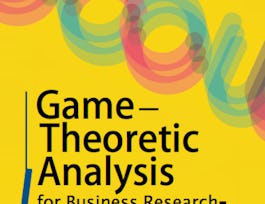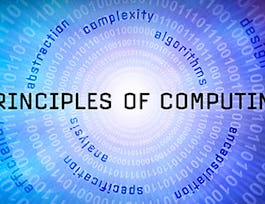This course provides a brief introduction to game theory. Our main goal is to understand the basic ideas behind the key concepts in game theory, such as equilibrium, rationality, and cooperation. The course uses very little mathematics, and it is ideal for those who are looking for a conceptual introduction to game theory.



Welcome to Game Theory

Instructor: Michihiro Kandori
Sponsored by PTT Global Chemical
99,999 already enrolled
(1,979 reviews)
What you'll learn
The reason why we need game theory to analyze social problems
Nash equilibrium as a unified solution concept and the reason why players come to play Nash equilibrium
The relationship between intellectual capacity of players and Nash equilibrium
The relationship between the rationality of individuals and socially desirable outcomes
Skills you'll gain
Details to know

Add to your LinkedIn profile
20 assignments
See how employees at top companies are mastering in-demand skills


Earn a career certificate
Add this credential to your LinkedIn profile, resume, or CV
Share it on social media and in your performance review

There are 4 modules in this course
Is it possible to analyze a wide variety of social and economic problems using a unified framework? In the first module, we address this question. We will see that the concept of rational decision making is useful, but it is not quite sufficient to provide governing principles. Motivated examples and some history of game theory will be provided. You will also be asked to play a simple card game to see how it feels to make your decisions strategically.
What's included
12 videos6 readings5 assignments
The basic solution concept of game theory is Nash equilibrium. In Module 2, we try to understand this central concept through various examples and ask the following crucial question: how do players come to play a Nash equilibrium?
What's included
10 videos1 reading5 assignments
In Module 3, we will dig deeper into the relationship between rationality and Nash equilibrium. We will consider the whole spectrum of possible intellectual capacities of players, spanning the range from unlimited ability for sophisticated reasoning to absolute zero intelligence. In the end, you will see that Nash equilibrium can emerge under a fairly wide range of intellectual capacities of players.
What's included
9 videos3 readings5 assignments
The final module is devoted to the most important and most general message of game theory: rational behavior quite often leads to a socially undesirable outcome. We will first try to understand the basic reason for this, and then see how this insight of game theory has made fundamental impacts in the natural and social sciences. Finally, we will learn some general methods to overcome this problem.
What's included
11 videos2 readings5 assignments
Instructor

Offered by
Why people choose Coursera for their career




Learner reviews
1,979 reviews
- 5 stars
74.83%
- 4 stars
20.51%
- 3 stars
3.03%
- 2 stars
0.80%
- 1 star
0.80%
Showing 3 of 1979
Reviewed on Dec 16, 2017
Simple to follow, focuses on introducing basic concepts rather than the math. Could be more in-depth though. Nonetheless, great precursor to the Game Theory course from Stanford.
Reviewed on Oct 15, 2017
Great introductory course. It's a bit light on math but the focus is clearly on understanding general concepts and principles of game theory. Both are very well explained.
Reviewed on Aug 11, 2016
This course is very interesting, it helps to understand basic knowledge in game theory) And it's also easy to understand, because of available explanations of material.
Recommended if you're interested in Social Sciences

National Taiwan University

Rice University

Illinois Tech

IE Business School

Open new doors with Coursera Plus
Unlimited access to 10,000+ world-class courses, hands-on projects, and job-ready certificate programs - all included in your subscription
Advance your career with an online degree
Earn a degree from world-class universities - 100% online
Join over 3,400 global companies that choose Coursera for Business
Upskill your employees to excel in the digital economy


